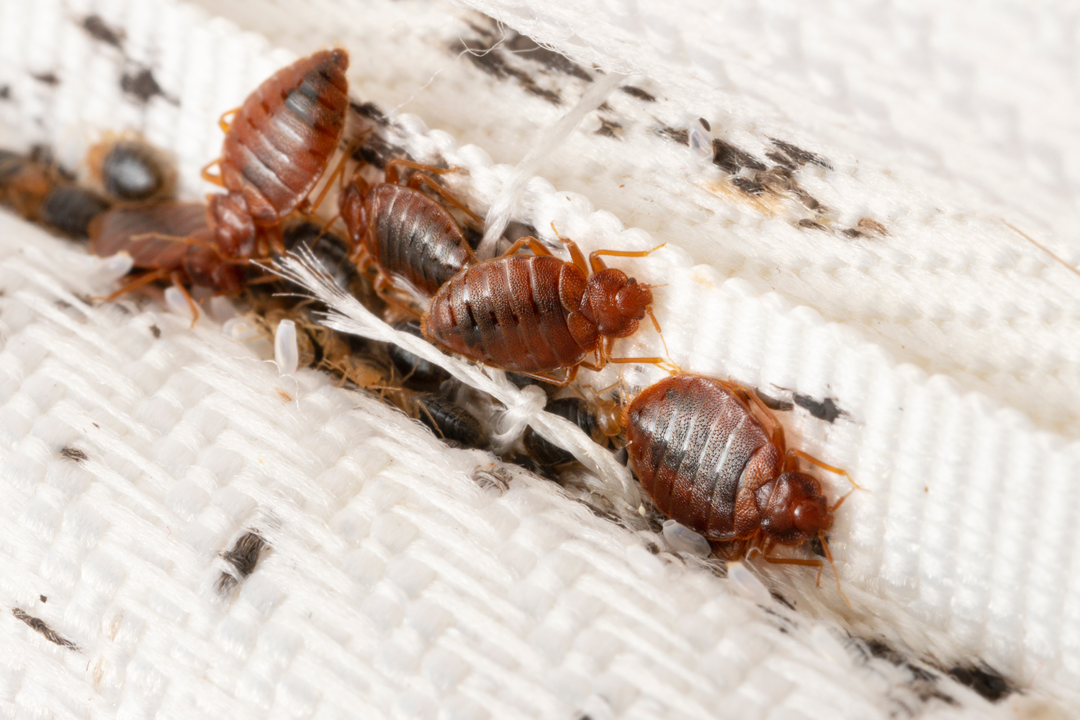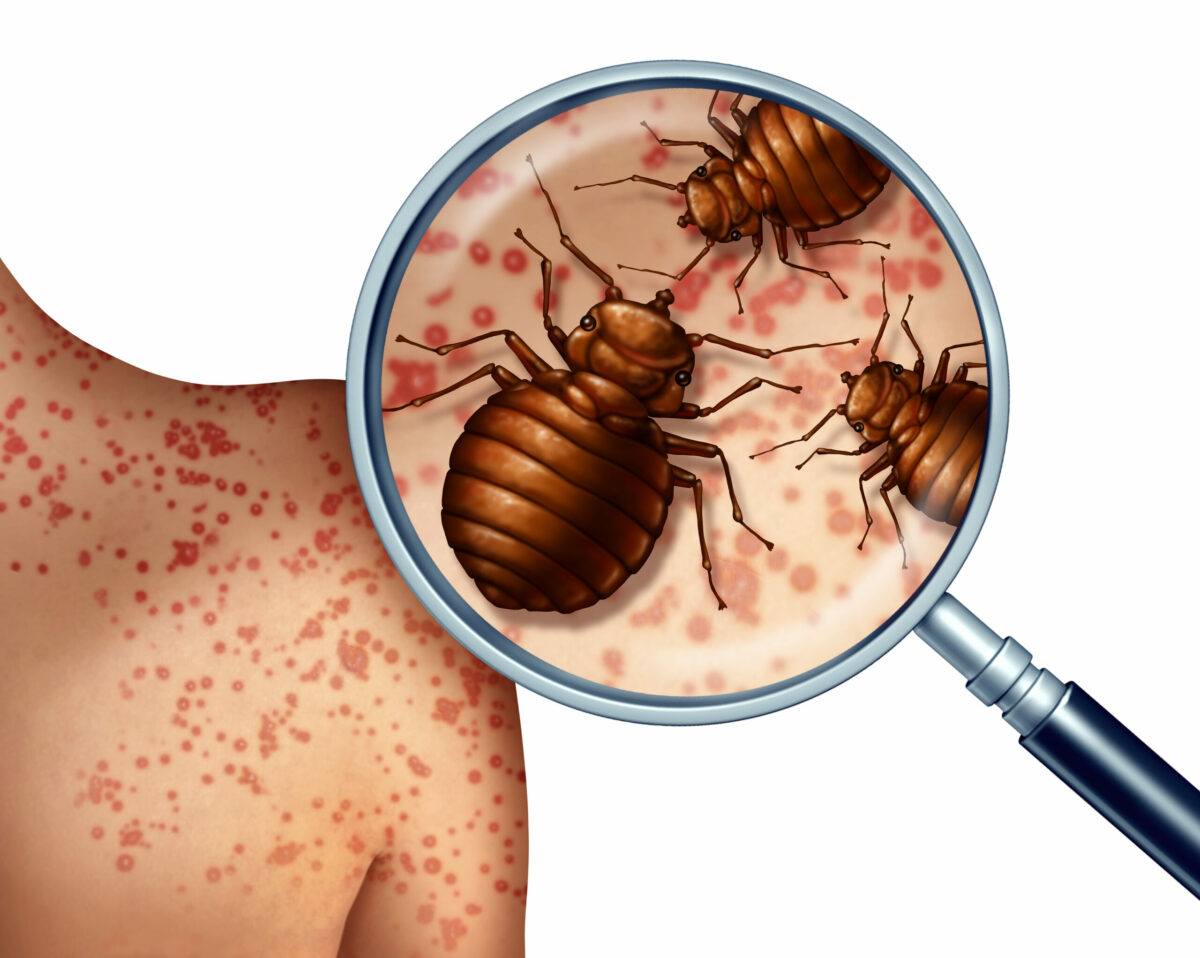Bed bugs can be a nuisance for homeowners, causing discomfort, and sometimes even severe skin reactions from their bites.
People are always on the lookout for natural, safe, and effective ways to eliminate them from their homes.
One such remedy that will help you get rid of bed bugs that has gained attention in recent years is the use of clove oil.
Derived from the clove plant, this essential oil is known for its strong scent and various health benefits, but it’s worth exploring whether it can actually help in getting rid of bed bugs.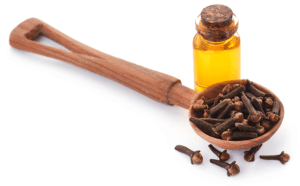
Research suggests that clove oil may indeed have some positive effects on bed bug populations.
A 2020 study found that exposing bed bugs to a compound with eugenol, a phenol compound derived from essential oils like clove, led to some bed bug deaths source.
Furthermore, it’s believed that the scent of cloves can repel bed bugs, preventing them from spreading and eventually causing their death source.
While clove oil should not be considered a complete solution for bed bug infestations, it can serve as a helpful and natural supplemental tool in the battle against these pests.
To effectively use clove oil against bed bugs, it is important to use the proper application methods, such as directly applying to affected areas using a cloth or cotton ball soaked in the oil, and combining it with other bed bug control measures.
Clove Oil and Its Properties
Eugenol
Clove oil is an essential oil extracted from the clove plant’s buds and leaves. It is known for its rich eugenol content, a phenol compound giving the oil its distinct properties.
Eugenol plays a crucial role in the insecticidal properties of clove oil. A 2020 study found that exposing bed bugs to a compound with eugenol resulted in some of the insects dying.
By causing paralysis and death in insects, eugenol makes clove oil particularly effective against pests like bed bugs.
Antimicrobial Properties
In addition to its insecticidal attributes, clove oil also has a variety of antimicrobial properties, making it a popular choice for treating bacterial, fungal, and viral infections. These properties include:
- Antiseptic: Clove oil has a long history of use as a natural antiseptic, helping to prevent the growth of harmful microbes and protect cuts or wounds from infection.
- Antifungal: The eugenol compound present in clove oil also contributes to its antifungal capabilities, effectively combating various fungal infections.
- Antibacterial: Studies have suggested that clove oil effectively inhibits the growth of certain bacteria, making it a useful antibacterial agent for various conditions.
Clove oil’s acidic pH also plays a role in its effectiveness against bed bugs, as the insects are not immune to it. This acidic nature, combined with the strong smell and eugenol content, helps eliminate or repel bed bugs.
To use clove oil for bed bug treatment, simply add a few drops to a cotton ball or piece of cloth and place it in the affected areas.
Effectiveness of Clove Oil as a Bed Bug Treatment
Insecticidal Properties
Clove oil possesses insecticidal properties, making it an effective treatment against bed bugs. This natural remedy works by disrupting the bed bug’s cell membrane, leading to irreversible damage and ultimately killing the pests.
The primary active ingredient in clove oil, eugenol, contributes to its repellent function, helping to prevent bed bug infestations in the first place. When applied to bedding and furniture, clove oil can keep bed bugs away.
Studies on Clove Oil Effectiveness
Several studies have demonstrated the effectiveness of clove oil in controlling bed bug infestations. In one experiment, applying clove oil to bed bugs resulted in a 100 percent mortality rate within 24 hours. This finding highlights the potency of clove oil as a natural insecticide against these resilient pests.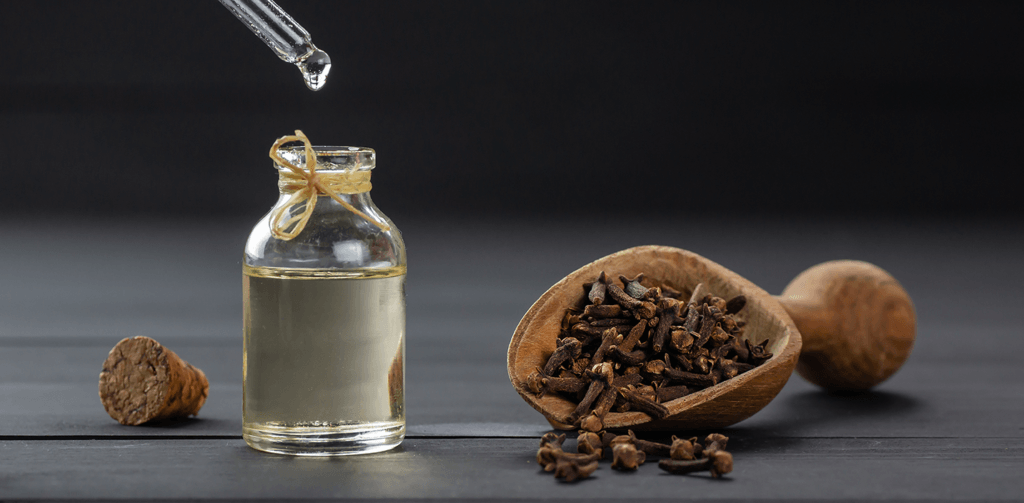
Moreover, essential oils, such as clove oil, have been shown to restore insecticide effectiveness against resistant bed bugs. The active ingredients in these oils, including eugenol from clove, thymol from thyme, and carvacrol from oregano and thyme, displayed equal effectiveness in killing resistant and non-resistant bed bugs.
An effective essential oil-based bed bug spray recipe, often used by eco-conscious homeowners, consists of 10 drops of peppermint essential oil, 10 drops of clove essential oil, and 2-3 drops of witch hazel. Such a combination may provide a natural and effective method for treating bed bug infestations.
While clove oil has demonstrated effectiveness against bed bugs, it is essential to consider other control methods as well, such as thorough cleaning, heat treatments, and professional pest control services, to ensure successful elimination of infestations.
Clove Oil as a Natural Remedy for Bed Bugs
Clove oil is known to be an effective solution to eliminate bed bugs as it disrupts their cell membrane, causing irreversible damage and killing them quickly source. Applying clove oil to bedding and furniture not only kills existing bed bugs but also serves as a natural repellent to prevent future infestations source.
Alternative Essential Oils
There are other essential oils that can be used as a natural remedy for bed bugs. Some of these include:
- Mint oil and peppermint oil: These oils are known to have a strong scent that repels bed bugs, providing a natural barrier for bedding and furniture.
- Lavender oil: Lavender has a calming scent that can help alleviate bites symptoms while also serving as a repellent for bed bugs.
- Tea tree oil: This oil has antifungal, antibacterial, and antiviral properties that can help with bites and skin irritation caused by bed bugs. It may also act as a deterrent for the pests.
However, homeowners should be cautious when using essential oils, as they might not be as effective for severe infestations.
Diatomaceous Earth
Diatomaceous earth is a popular, non-toxic alternative for bed bug control. It is a naturally occurring sedimentary rock that can be crushed into a fine powder. When bed bugs come into contact with diatomaceous earth, the powder absorbs their protective waxes, leading to dehydration and eventual death.
To use diatomaceous earth, simply sprinkle the powder around entry points, bedding, and furniture. It may take a few days to see results, but this method can provide effective and safe bed bug control. Check out my article on diatomaceous earth for more info.
Application of Clove Oil for Bed Bug Control
Clove oil has been proven to be an effective solution for bed bug control. It works by disrupting the bed bug’s cell membrane, causing irreversible damage that quickly kills them. Let’s explore how to use clove oil for bed bug control through creating a clove oil spray and combining it with carrier oils.
Creating a Clove Oil Spray
To make a clove oil spray, follow these steps:
- Fill a spray bottle with water.
- Add a few drops of clove oil for every cup of water.
- Shake the spray bottle to mix the solution well.
You can now use this spray to target bed bugs hiding in your home. Apply it liberally on bedding, furniture, and other areas where you suspect there might be bed bugs.
Keep in mind that while clove oil is effective at repelling and killing these pests, it may be necessary to combine it with other pest control measures to completely eliminate the infestation.
Using Clove Oil with Carrier Oils
In addition to making a spray, clove oil can be combined with carrier oils to enhance its effectiveness against bed bugs. Different carrier oils, such as eucalyptus or thyme oil, can offer additional benefits for pest control.
Here’s how to use clove oil with carrier oils:
- Mix several drops of clove oil with a tablespoon of your chosen carrier oil (eucalyptus, thyme, or another preferred oil).
- Apply the mixture to a cotton ball or cloth.
- Wipe down infested areas, paying close attention to cracks and crevices where bed bugs may hide.
Carrier oils not only help with the application of clove oil, but they can also provide their specific benefits in pest control. For instance, thyme oil has been proven to be effective against bed bugs as well. Combining clove oil with other essential oils may increase the chances of successfully getting rid of bed bugs.
Safety Considerations and Risks of Using Clove Oil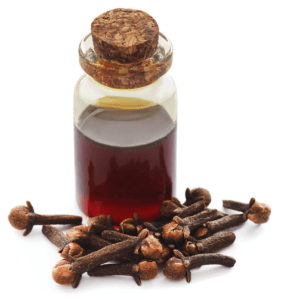
Potential Side Effects
While clove oil has been shown to be effective in killing bed bugs, it is essential to be aware of potential side effects.
Prolonged or improper use of clove oil can cause irritation, burning sensation, and rashes on the skin. It is especially important to use caution if you have sensitive skin or are prone to allergies.
To minimize the risk, always dilute the clove oil with a carrier oil, such as almond or coconut oil, before applying it to the skin or any surface.
Another side effect of using clove oil is its acidic nature. With a low pH, it can potentially damage wooden furniture, fabric, and other surfaces. Always do a patch test before applying clove oil to a larger area.
Using Clove Oil Around Children and Pets
Clove oil can be a safe alternative to traditional pesticides, but extra care must be taken when using it around children and pets.
Ingestion of clove oil can cause digestive issues, and it is toxic when ingested in large amounts. When using clove oil, particularly around children, ensure that the treated areas are out of their reach or supervise them closely.
Pets, such as cats and dogs, can be sensitive to essential oils, including clove oil. While clove oil has not been shown to cause resistance in bed bugs, it is essential to understand that it can have different effects on animals.
For example, geraniol, a compound found in clove oil, can be toxic to cats. Therefore, to ensure the safety of your pets, it is best to consult with a veterinarian before using it in areas where your pets may have contact.
In conclusion, clove oil can be a useful and eco-friendly solution for bed bug infestations. However, it is crucial to consider the potential side effects, precautions around children and pets, and its effects on your furniture and belongings. By taking these factors into account, you can effectively and safely use clove oil in your battle against bed bugs.
Professional Extermination and Alternatives
When dealing with a bed bug infestation, many people turn to professional exterminators for help. These experts have experience in handling bed bugs and utilize effective methods, including chemical treatments, to eradicate the pests. In some cases, alternative solutions like clove oil might be considered.
Hiring a professional exterminator can cost anywhere from $800 to $1200 for a single infestation treatment, depending on the location and severity. For more info on expenses due to bed bug issues, check out our article on the topic.
Typical chemical treatments employed by exterminators include pyrethrins and pyrethroids. These chemicals are specifically designed to eliminate bed bugs and disrupt their reproductive cycle.
Despite the effectiveness of chemical treatments, some people may prefer natural alternatives to address bed bug issues. One such alternative is the use of essential oils like clove oil.
Clove oil is said to have some repellent properties and can be applied to furniture and linens to help deter bed bugs.
A 2020 study suggested that exposure to eugenol, a compound derived from clove oil, resulted in the death of some bed bugs. Another option is thyme oil, which is considered less potent but still effective in managing bed bug infestations.
In addition to clove oil and thyme oil, other essential oils like lavender, peppermint, and tea tree oil have also been found to have natural deterrent properties against bed bugs. These oils can be combined with preventative measures like washing linens in high heat and vacuuming to help manage infestations.
While essential oils can be a natural way to address bed bug problems, it’s important to consider the severity of the infestation and whether professional extermination might be necessary.
In some cases, a combination of chemical and natural treatments may prove to be the most effective approach to dealing with bed bugs. Remember, it’s always best to consult an expert before taking matters into your own hands.
Conclusion
In conclusion, clove oil has been found to be an effective solution in killing bed bugs. Research has shown that it works by disrupting the bed bug’s cell membrane, causing irreversible damage that quickly kills them. This makes clove oil not only an environmentally friendly option but also an economical one.
Clove oil, which contains eugenol, has been studied for its insecticidal properties. A 2020 study found that eugenol is effective against bed bugs.
Additionally, clove oil has been shown to cause paralysis and death in insects, making it a potent natural remedy for bed bug infestations.
To use clove oil to combat bed bugs, a few drops can be added to a cotton ball or piece of cloth, creating a homemade treatment that can be applied directly to the infested area.
However, care should be taken to ensure proper ventilation when using clove oil, as it may be irritating to some individuals.
In summary, using clove oil can be an effective and natural way to kill bed bugs. By incorporating it into bed bug treatments, homeowners can take advantage of its insecticidal properties without the need for harsh chemicals in their homes.
Q: Can clove oil kill bed bugs?
A: Yes, clove oil can kill bed bugs.
Q: How does clove oil kill bed bugs?
A: Clove oil contains a compound called eugenol, which is toxic to bed bugs. When bed bugs come into contact with clove oil, it can kill them.
Q: Can clove oil get rid of a bed bug infestation?
A: While clove oil can kill individual bed bugs, it may not be effective in eliminating an entire infestation. Mixing with other oils can make it into a more potent formula. I like to mix in peppermint and cedar wood for max results.
Q: Can clove oil repel bed bugs?
A: Yes, clove oil can repel bed bugs. The strong scent of clove oil can deter bed bugs and prevent them from approaching certain areas.
Q: Can lavender oil kill bed bugs?
A: No, lavender oil does not have the same toxic properties as clove oil and may not be effective in killing bed bugs.
Q: Can rubbing alcohol kill bed bugs on contact?
A: Yes, rubbing alcohol can kill bed bugs on contact. It acts as a desiccant, drying out their exoskeletons and killing them.
Q: Can essential oils be used to treat a bed bug infestation?
A: Yes, but essential oils alone may not be sufficient to treat a large bed bug infestation. One of the most common remedies that can help is to also wash all bedding and clothing as it’s an effective way to kill bed bugs and their eggs. Heat treat beds and sofas with a steamer (handheld is fine) or freeze delicate items at least 48 hours.
Q: Are there any effective bed bug repellants?
A: Yes, there are commercial bed bug repellants available in the market that are effective at killing bed bugs. For a natural bed bug repellant, we now believe that essential oils can be used to repel bed bugs.
Q: Can essential oils repel or kill bed bugs?
A: Yes. Essential oils like thymol, tea tree oil and others, are great at repelling bedbugs because their scent is so strong if applied at the proper concentration. Many pure form oils will kill a bed bug by contact. Make sure you wear gloves when handling concentrated oils.
Q: How can I get rid of bed bugs naturally?
A: Bedbugs can be one of the most difficult pests to eliminate. Natural methods to rid your home from bed bugs include using essential oils, such as clove oil, lemon grass oil, oils like thymol and carvacrol to name a few, and regularly washing and vacuuming infested areas.
Steaming has proven to be a helpful addition into the integrated pest management system you draw up. Here at GBBS, you will find all the information you need to do just that.


